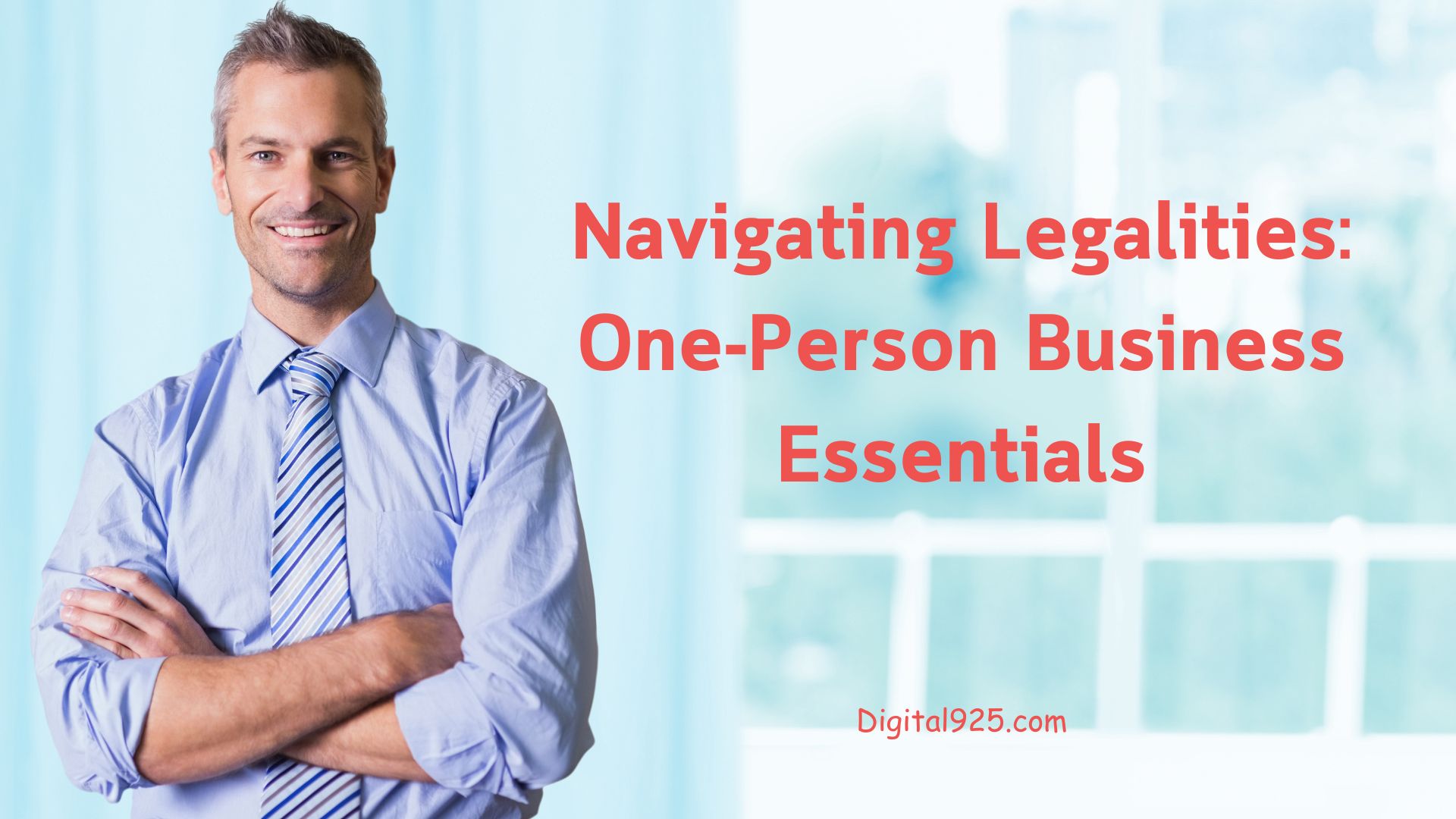Navigating Legalities: One-Person Business Essentials
Starting a one-person business can be an exciting venture, but it comes with its own set of legalities and responsibilities. These one-person business essentials will prove to be important.
To ensure your business operates smoothly and within the confines of the law, it’s crucial to navigate these legalities effectively.
When embarking on the exciting journey of launching a startup, it’s imperative to have your legal affairs in order from the get-go. Proper legal preparation can protect your business, your assets, and your vision.
In this in-depth guide, we’ll walk you through the One-Person Business Essentials of running a one-person business, covering everything from registration to contracts.
Whether you’re a freelancer, consultant, or sole proprietor, this post is your roadmap to success in the world of one-person businesses.
Navigating Legalities: One-Person Business Essentials
In this section, we’ll delve into the core legal aspects of running a one-person business.
Business Structure
The first decision you’ll face is choosing the right business structure.
Options include sole proprietorship, LLC, or corporation. Each type comes with its own legal implications and tax consequences.
Consult with a legal expert to determine which structure suits your business best. Creating a solid legal foundation is paramount to your business’s longevity.
Registration and Licensing
Before you can officially operate your business, you’ll likely need to register it with the appropriate government authorities and obtain the necessary licenses.
This step ensures that you’re conducting your business legally and avoids potential legal issues down the road.
Taxation
This part is very important and when done correctly will save you a lot of time and money. Understanding tax regulations is crucial for any business owner.
One-person businesses often have unique tax considerations.
Ensure you keep meticulous financial records, consider deductions, and pay taxes on time to stay in compliance with the law.
Some key tax-related considerations include:
- EIN and State Tax ID: Obtain the necessary tax identification numbers.
- Sales Tax: Determine if your business needs to collect and remit sales tax.
- Income Tax: Comply with federal and state income tax requirements, including estimated tax payments.
Contracts and Agreements
Contracts are the backbone of any business. Learn how to draft clear, legally binding contracts for your clients or partners.
Contracts protect your interests and outline expectations, reducing the risk of disputes. Well-drafted contracts and agreements are the foundation of a successful business.
Be sure to create and maintain the following:
- Founder’s Agreement: Clearly outline roles, responsibilities, and equity distribution among co-founders.
- Customer Contracts: Define the terms and conditions of your product or service offerings to avoid disputes.
- Vendor Agreements: Establish clear expectations and obligations with suppliers and service providers.
Intellectual Property
If your business involves creating content, products, or services, you’ll want to protect your intellectual property rights.
Trademarks, copyrights, and patents can safeguard your work from unauthorized use.
Protecting your intellectual property is vital, especially if your startup relies on innovative ideas, branding, or proprietary technology.
Consider these key steps:
- Trademark Registration: Safeguard your brand name and logo by registering them as trademarks. This will prevent others from using similar branding.
- Patent Applications: If your startup has unique inventions or products, consider applying for patents to protect your innovations.
- Copyrights: Protect your creative works, such as software, content, and designs, through copyright registration.
Funding and Investments
If your startup is seeking external funding, navigate the legal aspects carefully:
- Term Sheets: Work with legal experts to review and negotiate investment terms.
- Equity Crowdfunding: Comply with SEC regulations when raising funds from non-accredited investors.
Liability and Insurance
One-person businesses may face personal liability.
Consider obtaining liability insurance to protect your assets in case of unforeseen events or legal actions against your business.
Insurance provides a safety net for unexpected events that can disrupt your startup’s operations. Consider these types of insurance:
- General Liability Insurance: Protects against third-party claims of injury or property damage.
- Professional Liability Insurance: Essential for service-based startups to cover errors or omissions.
- Worker’s Compensation Insurance: Required in most states to provide benefits to injured employees.
Regulatory Compliance
Compliance with local, state, and federal regulations is non-negotiable. Ensure you are adhering to all relevant laws and industry-specific regulations.
Seek legal counsel to help you navigate compliance issues effectively.
GDPR Compliance
If you deal with European customers, understanding and complying with the General Data Protection Regulation (GDPR) is essential.
GDPR regulates how personal data is collected and processed, and non-compliance can result in hefty fines.
E-commerce Regulations
For online businesses, compliance with e-commerce regulations is crucial.
Be aware of consumer protection laws, privacy policies, and electronic transaction regulations that apply to your specific niche.
Employment and HR
As you hire employees, familiarize yourself with employment laws and HR best practices:
- Employee Handbooks: Develop clear policies and procedures to guide your workforce.
- Compliance Training: Ensure that your team understands workplace regulations and anti-discrimination laws.
Employment Laws
Even as a solo entrepreneur, you may hire freelancers or contractors. Familiarize yourself with employment laws to ensure fair and legal treatment of your workforce.
Environmental Regulations
Depending on your industry, you might need to adhere to environmental regulations. These may include waste disposal, emissions, or energy efficiency standards.
Dispute Resolution
Should conflicts arise, understanding dispute resolution mechanisms such as mediation or arbitration can save you time and legal fees.
Banking and Finance
Separate your personal and business finances. Open a business bank account to simplify accounting and tax reporting.
Record Keeping
Maintaining accurate financial records is essential for tax compliance and financial stability. Invest in bookkeeping software or hire a professional if needed.
Customer Data Protection
Ensure customer data security and comply with data protection laws in your jurisdiction.
Contract Negotiation
Hone your negotiation skills for better contracts and deals.
Online Marketing Regulations
Stay informed about online marketing laws, including advertising and email marketing regulations.
Succession Planning
Even as a one-person business, consider succession planning for the long term.
Environmental Responsibility
Implement eco-friendly practices to contribute positively to the environment.
Exit Strategy
Even at the startup stage, it’s wise to plan for the future.
Consider potential exit strategies:
- Buy-Sell Agreements: Establish a clear process for selling or transferring ownership.
- Mergers and Acquisitions: Prepare for the possibility of being acquired or merging with another company.
Conclusion
In conclusion, launching a startup is an exhilarating endeavor, but it comes with substantial legal responsibilities.
To ensure the long-term success and protection of your business, take heed to these one-person business essentials. Consult with legal professionals who specialize in startups and follow this comprehensive legal checklist.
Remember, the success of your startup depends not only on your innovative ideas but also on your ability to protect and navigate the legal aspects of your business. Take the necessary one-person business essentials steps to secure your startup’s future from day one.
FAQs
Q: How do I choose the right business structure for my one-person business?
A: The choice of business structure depends on various factors, including your tax preferences and liability concerns. Consult with a legal expert to determine the best fit for your specific circumstances.
Q: Do I need liability insurance for my one-person business?
A: While it’s not mandatory, liability insurance can provide valuable protection for your personal assets in case of legal claims against your business.
Q: What are the key elements of a well-drafted business contract?
A: A good contract should include clear terms, payment details, deliverables, deadlines, and dispute resolution procedures.
Q: How can I ensure GDPR compliance for my one-person business?
A: Start by understanding the basics of GDPR, and if you deal with European customers, consider seeking legal advice to ensure full compliance.
Q: What should I consider when expanding my one-person business?
A: Expansion involves legal considerations such as registrations, licenses, and compliance with regulations in new locations. Consult with legal experts as needed.
Q: What are some eco-friendly practices I can implement in my one-person business?
A: You can reduce waste, conserve energy, and choose sustainable suppliers to minimize your environmental impact.







